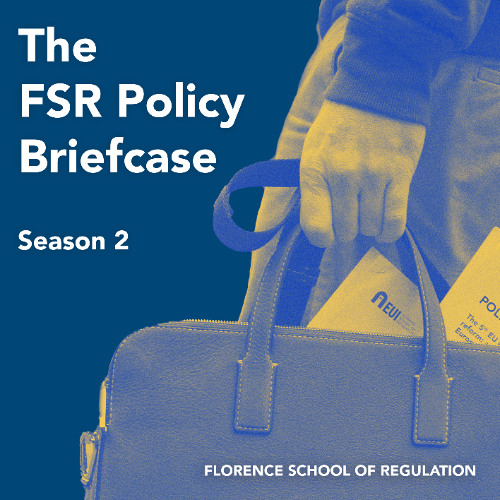FSR Climate Annual Conference 2016

Programme
Papers and presentations
Videos
The FSR Climate Annual Conference focused on the economic assessment of European climate policies.
The conference covered the main climate-related existing policies, at EU, national and subnational levels and included four sessions, each of them with an invited speaker:
• EU ETS: Simone Borghesi (University of Siena)
• Carbon/energy taxation: Thomas Sterner (University of Gothenburg)
• Energy efficiency policies: Joachim Schleich (Grenoble Ecole de Management and Fraunhofer ISI)
• Renewable policies: Karsten Neuhoff (DIW Berlin and Technical University Berlin)
Roger Guesnerie (Collège de France), gave the keynote speech.
Jos Delbeke, Director General for Climate Action, European Commission, attended the conference and gave a keynote speech during the social dinner of the event.
Videos
Interview with Jos Delbeke, Director General for Climate Action, European Commission
Keynote speech:
Roger Guesnerie, Collège de France
Plenary Presentations
Karsten Neuhoff, DIW Berlin
Heterogeneity in household preferences – implications for energy efficiency modeling and policy
Joachim Schleich, Grenoble Ecole de Management
Carbon tax: an option in designing climate policies
Thomas Sterner, University of Gothenburg
The EU ETS and its followers: connecting the dots
Simone Borghesi, University of Siena
Papers/Presentations
1 DECEMBER
Plenary presentation
How can renewables support Europe Karsten Neuhoff, DIW Berlin
Session 1: Energy and carbon taxation
Cars, carbon taxes and CO2 emissions (PAPER) Julius Andersson, LSE
Is the gasoline tax regressive in the twenty-first century? Taking wealth into account (EUI WORKING PAPER) Jordi J. Teixidó, Stefano F. Verde, FSR Climate, EUI
Tax incidence in the fuel market: evidence from station-level data (PAPER) Jarkko Harju, Tuomas Kosoneny, Marita Laukkanen, VATT
Efficiency and distributional impacs of Swiss energy policies Mirjam Kosch, ETH Zurich, Florian Landis, Sebastian Rausch
Session 2: Renewable energy
Carbon mitigation in the electric power sector under cap-and-trade and renewables policies (PAPER) Eric Delarue, KU Leuven, Kenneth Van den Bergh
The impact of carbon pricing on renewables’ profitability (PAPER) Alexander Verhagen, Kris Poncelet, Eric Delarue, KU Leuven
Renewables vs. conventional power: peak-load pricing with different types of dispatchability (PAPER) Klaus Eisenack, Mathias Mier, University of Oldenburg
The French nuclear bet (PAPER) Quentin Perrier, CIRED
How critical is the CO2 price for the recovery of electricity prices in CWE? Johan Albrecht, Gent University, Lennert Thomas, Sam Hamels
Keynote speech:
Economic debates on the design of climate policies : selected insights
Roger Guesnerie, Collège de France
Plenary presentation
Heterogeneity in household preferences – implications for energy efficiency modeling and policy
Joachim Schleich, Grenoble Ecole de Management
Session 3: Climate and energy policy issues
The role of moderate carbon prices in electricity sector decarbonisation (see chapter 3) Jesse Scott, IEA
Hitting the mark on missing money: how to ensure reliability at least cost to consumers (PAPER) Michael Hogan, Regulatory Assistance Project
EU Reference Scenario 2016 Energy, transport and GHG emissions (REPORT) Joan Canton, DG Energy, European Commission
Translating the collective climate goal into a common climate commitment (POLICY BRIEF) – presentation Peter Cramton, University of Maryland and EUI, Axel Ockenfels, Jean Tirole
Session 4: Households and climate policies
Preferences for energy efficiency vs. renewables: how much does a ton of CO2 emissions cost? (download the paper here) Anna Alberini, Andrea Bigano, Milan Ščasný, Charles University, Iva
Zvěřinová
Which climate change policies do Czech, British, and Polish citizens prefer? (PAPER, see also the presentation) Milan Ščasný, Iva Zvěřinová, Charles University, Mikolaj Czajkowski, Eva Kyselá, Katarzyna Zagórska
Welfare and redistribution in energy markets with solar power Fabian Feger | University of Bern, Nicola Pavanini, Doina Radulescu
Carbon is forever: a climate change experiment on cooperation Giacomo Calzolari, Marco Casari, University of Bologna, Riccardo Ghidoni
Plenary presentation
Carbon tax: an option in designing climate policies
Thomas Sterner, University of Gothenburg
Session 5: International dimension of climate policy
The effect of carbon taxes on emissions and carbon leakage: evidence from the European Union Maria Alsina Pujols, University of Zurich
Carbon-motivated border tax adjustment: a proposal for the EU Paola Rocchi, University of Barcelona, Iñaki Arto Jordi Roca Mònica Serrano
Foreign direct investment and the pollution haven hypothesis – evidence from listed firms Grégoire Garsous, OECD, Tomasz Koźluk
Global warming as an asymmetric public bad (PAPER) Louis-Gaëtan Giraudet, CIRED, Céline Guivarch
Session 6: Multiple instruments in climate policy
Second-best analysis of European energy policy: is one bird in the hand worth two in the bush? Carolyn Fischer, Michael Hübler, Oliver Schenker, Frankfurt School of Finance and Management
Equity vs efficiency in energy regulation Carolyn Fischer, Resources for the Future, William Pizer
Paradox of overlapping climate policy Instruments Roland Magnusson, University of Helsinki
Compliance technology and self-enforcing agreements (PAPER) Alessia Russo, University of Oslo, Francesco Lancia, Bard Harstad
2 DECEMBER
Session 7: Investment and innovation
Laggard sectors and green growth policies Claudio Baccianti, ZEW
Investment, technological progress and energy efficiency (PAPER) Antonia Diaz, Luis A. Puch, Universidad Complutense de Madrid
The political economy of energy innovation (PAPER) Shouro Dasgupta, FEEM, Enrica De Cian, Elena Verdolini
Session 8: EU ETS
EU ETS, free allocations, and activity level thresholds: the devil lies in the details Frédéric Branger, Jean-Pierre Ponssard, Oliver Sartor, Misato Sato, LSE
Emission benchmark setting in the materials sector: an analytical framework Vera Zipperer, Misato Sato, Karsten Neuhoff, DIW Berlin
Differentiating permits allocation across areas Jean-Philippe Nicolai, ETH Zurich, Jorge Zamorano
Facts and figures for finalising an effective reform of the EU Emissions Trading System (PAPER – see also presentation) Stefan P. Schleicher, University of Graz, Angela Köppl, Alexander Zeitlberger
Plenary presentation
The EU ETS and its followers: connecting the dots
Simone Borghesi, University of Siena
Other conference’s editions:
FSR Climate Annual Conference 2017
FSR Climate Annual Conference 2015
Bios of keynote and invited speakers
 Simone Borghesi
Simone Borghesi
Simone Borghesi (M.Sc. University College London, Ph.D. European University Institute) is Associate Professor at the University of Siena. He worked at the International Monetary Fund, the Fondazione ENI Enrico Mattei and the University of Pescara. He is currently President-elect of the Italian Association of Environmental and Resource Economists (IAERE) and Co-director of the research group R4S (Regulation for Sustainability). He has been member/Unit coordinator of several Italian and European research projects and invited to the UN 2012 High-Level Meeting on Happiness and Wellbeing: Defining A New Economic Paradigm. He published over 50 articles in edited volumes and peer-reviewed international journals and three books. His main research areas are globalisation and sustainable development, the environmental Kuznets curve, emission trading, evolutionary game models.
 Roger Guesnerie
Roger Guesnerie
Roger Guesnerie has been Professor at Collège de France and Chairman of the Board of the Paris School of Economics until 2015. He has taught in France and abroad, (LSE and top American Universities) and served as coeditor of Econometrica (1984–1989). He has published more than a hundred academic articles and a dozen of books. His fields of interest include general equilibrium, public economics, incentives and mechanism design, and more recently the assessment of expectations formation and climate policies. He was elected President of several scholarly societies, notably the Econometric Society (1996), and the European Economic Association (1994). He is a Foreign Member of the American Academy of Arts and Science.

Karsten Neuhoff
Karsten Neuhoff is head of the Department Climate Policy at the German Institute for Economic Research and Professor for Energy and Climate Policy at the Technical University Berlin. He has published 42 journal articles and 4 books on the topic of Power Market design, Technology Policy in the context of materials sector and renewables technologies, Emission Trading and International Climate Policy. He is leading research and advice projects for the EU Commission and governments for several EU member states. He holds a Diploma in Physics from the University of Heidelberg, an MSc in Economics from the London School of Economics, and a PhD in Economics from the University of Cambridge.
 Joachim Schleich
Joachim Schleich
Joachim Schleich received economics degrees from University of Mannheim (Diploma), University of Florida (MSc) and Virginia Tech (PhD). He is Professor of Energy Economics at Grenoble Ecole de Management (France), where he leads the Energy Management Team. He is also employed at the Fraunhofer Institute for Systems and Innovation Research (Germany), and an Adjunct Professor at Virginia Tech (USA). Schleich has consulted for the European Commission and several national governments on energy efficiency policy, the EU ETS, and international climate policy. He has published more than forty articles in peer-reviewed journals. His current research focuses on conceptual and empirical analyses of factors driving company and household adoption of energy-efficient technologies, the evaluation of energy efficiency policies, and on corporate response to the EU ETS.
 Thomas Sterner
Thomas Sterner
Thomas Sterner, is Professor of Environmental Economics at the University of Gothenburg. His research focuses on the design of policy instruments to deal with resource and environmental problems. Sterner has published more than a dozen books and a hundred articles in refereed journals, mainly on environmental policy instruments with applications to energy, climate, industry, transport economics and resource management in developing countries. With Gunnar Köhlin, he has founded the Environment for Development Initiative. Sterner is the recipient of the Myrdal Prize and has been President of the European Association of Environmental and Resource Economists. In 2012-2013 he served as Visiting Chief Economist of the Environmental Defense Fund in New York and in 2015-2016 he was guest professor at the Collège de France.
Don’t miss any update on our events
Sign up for free and access the latest events from our community.













